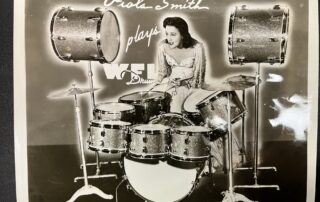Earl Holzman’s life has always revolved around music. He met his wife DoAnn Holzman while folk dancing in the early 1980s. Together, they raised their son Ian Holzman to be a fiddle player. It’s only fitting that Earl Holzman would become a luthier, or person who builds stringed instruments. He built a family business around the nyckelharpa, a fairly uncommon instrument in the United States.
“A nyckelharpa is a Swedish traditional folk instrument,” Earl Holzman explained, “In Swedish, ‘nyckel’ means ‘key’ so it’s a keyed harp.”
The traditional nyckelharpa is three feet long. It looks like a relative of the violin, except for a series of downward-facing wooden keys along the neck. There are a total of 16 strings, four raised strings that are played with a bow and 12 resonant strings underneath.
“As you play a tune, those resonation strings start to hum,” Holzman said, “It fills out the sound, so you have this acoustic instrument with built in reverb and it’s all natural.”
The instrument is played by pressing up on the keys with the left hand while using the bow in the right hand. Holzman says it’s a cross between a guitar, violin and accordion.
“It’s an instrument that basically can play just about any type of music you can play on a violin, and so, extremely versatile,” Holzman said.
Earl Holzman’s luthier career began when he took his son to a Swedish music festival.
“He gets an opportunity to play a nyckelharpa, and in about 10 minutes he’s ripping out tunes,” Holzman recalled, “He decides ‘Dad, I want one.’”
Holzman already had a full woodworking shop in his basement. He ordered a kit and built a nyckelharpa with his son’s help.
“He came out of it with pretty much a playable instrument,” Holzman said.
A few years later, Earl Holzman was involved in a serious car accident that severely injured his back. Everyday hobbies were suddenly obstacles.
“My back would start to hurt and I was using that as an indication of what I can’t do, so I’ve got this extensive list of things I can never do again,” Holzman said, “I’m going crazy because I need something to do to keep busy, so I remembered I had this set of plans for a nyckelharpa.”
Holzman traveled to Sweden and spent two weeks learning from Esbjörn Hogmark, a master nyckelharpa builder.
“I’m on the airplane coming back and thinking about it saying ‘I can do this,’” Holzman said.
Earl Holzman quit his job as a civil engineer and began building nyckelharpas full time out of his Eau Claire home. Holzman Folk Traditions was born. He now builds six to eight nyckelharpas a year for clients across North America. He works together with his wife making wooden nyckelharpa bows. Their son, an accomplished musician, sometimes serves as quality control.
“What gives me the most enjoyment is when I hand the instrument to somebody who is actually a really good player, who can put the instrument through the paces and kind of prove to me that everything works, and it sounds good,” Holzman said.
Earl Holzman jokes that his second career was back therapy that got out of hand.
“I guess perhaps this was meant to be. I had a couple people tell me that this is what I was supposed to end up doing,” Holzman said, “I can’t argue with that, but I’m having fun.”
To hear more from Earl Holzman, check out this Wisconsin Life audio story.
Cahan O’Hara Rondeau
Ian Holzman plays “Cahan O’Hara Rondeau” on the nyckelharpa, a Swedish traditional folk instrument.










